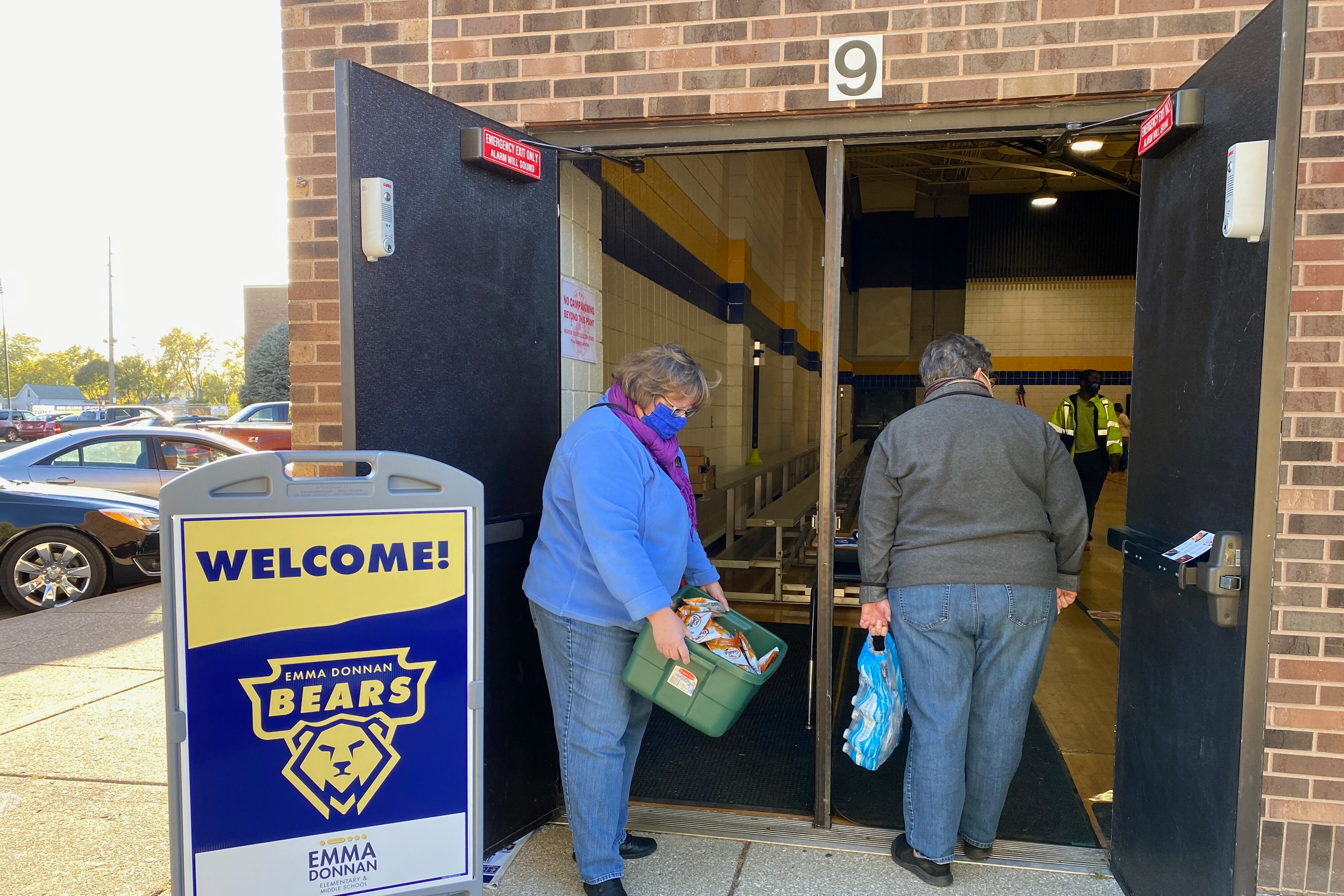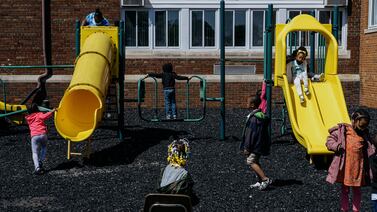When hundreds of people first descended on the Indiana Statehouse this year, it wasn’t to weigh in on what would become the state’s abortion ban, or even the future prohibition on transgender youth in girls’ sports.
Instead, speakers lined up to provide hours of testimony on a sweeping proposal to regulate how teachers discuss race and racism in the classroom.
While House Bill 1134 eventually failed, it made an impression on a new crop of statehouse candidates from across the political spectrum who cite the education legislation as a big reason they’re running.
They believe lawmakers overstepped when they tried to meddle in curriculum. And they link the bill — which was part of a wave of similar legislation nationwide in 2022 — to a broader pattern of Indiana’s disinvestment from education over the years.
Some advocates and candidates are already bracing for another fight over curriculum restrictions next year — but even the echoes of the legislation could bring voters to the polls.
It has already fueled the public’s re-engagement with education issues in a way that could sweep more teachers and school-focused candidates into office, said Andy Downs, director emeritus of the Mike Downs Center for Indiana Politics at Purdue University.
A similar phenomenon — which grew out of the public’s reactions to new policies on testing and accountability — led to the 2012 upset election of Democrat Glenda Ritz for the state superintendent’s position, he said.
“Teachers came out and demonstrated their force,” Downs said. “When you get people involved in politics, when they know what’s going on, and they support a teacher running for office or a parent running for office, it becomes easier to do that.”
Next year, the stakes could be even higher. In a budget year, lawmakers could tie funding to some of the points of the curriculum bills, Downs said.
Watching the curriculum bill unfold
Last session, Joey Mayer, a Democrat and business owner, watched as her state representative, Republican Donna Schaibley, voted in favor of House Bill 1134 and another controversial bill to allow permitless carry of firearms.
That was enough, she said, to call the Hamilton County Democratic Party in February and ask how to support Schaibley’s challenger in House District 24, which includes a large area around Westfield.
But the party didn’t have a challenger. And the deadline to file was just a week away. Would Mayer herself want to run?
Initially, Mayer said no — running for the statehouse was not on her bucket list. But a conversation with her husband led her to drive through a snowstorm on the day of the deadline to file her paperwork.
“I told my husband, can you believe they said this? And he told me, ‘You could spend two years storming and ranting and not changing anything, or you could channel that energy and rage into something that may make a difference,’” she recalled.
Mayer had had a front row seat to growing local tension around content in schools as one of the leaders of Westfield Parents for Change, an organization that sought to fight racism in Westfield schools. The group squared off with others over what kinds of books would be allowed in the district’s elementary schools.
Despite those conflicts, she said the experience of talking to other families in the school district taught her that ultimately, most people wanted the same things for their children.
“I have faith in people’s parenting abilities. I believe they’re capable of having an uncomfortable conversation and reinforcing their family values if those values are tested,” Mayer said.
Rather than disavow lessons on diversity, equity, and social-emotional learning, Mayer said she hopes the state embraces them as critical skills for young people beginning their careers: “You can be the smartest person in the room but if you can’t get along with everyone, you won’t be effective.”
Still, Mayer worries the curriculum bill could make a comeback in the future.
“I’m concerned that it was a trial balloon to see what people most objected to,” she said. “And they’re going to slice and dice it and shove it in other legislation next year.”
Keeping teachers on the job
Some believe the curriculum bill was problematic due to the distraction it created from other issues.
Jordan Davis, a Republican candidate for House District 87 in northeast Indianapolis, said he has watched lawmakers pass bills that tilted too far towards ideological extremes, but didn’t address the underlying problems in his community.
“We’re not passing legislation on funding that’s needed to make sure our future generations are taken care of,” Davis said. “That really bothered me.”
Davis’ campaign platform says it’s important for parents to choose what their children learn and where they learn it. But with House Bill 1134, he said lawmakers took the wrong approach by doing things to educators and not with them.
Instead, Davis said he would have met with teachers first to gauge their thoughts on the proposal and how to reduce their workload.
Moreover, as the state heads into a budget year, Davis said the priority for education legislation should be securing more funding for teachers in order to provide raises and improve retention.
“The state has a history of championing our workforce, but then we forget them when it’s time to pay dues,” he said.
Larger patterns in Indiana education
Many of this year’s candidates see links between Indiana’s past policies on school funding and accountability and the recent push for curriculum restrictions.
“This is nothing new,” said Ken Tucker, a teacher and independent candidate in House District 24. For many years, he said, “The state of Indiana has taken out of the mouths of my children and put more on my plate as a teacher, in terms of what they want me to do and how much they expect.”
Tucker pointed to the state’s embrace of standardized testing as another way that legislators have tried to take control in the classroom, while creating more work for teachers. Such decisions have exacerbated a shortage of teachers in the state, he and likeminded candidates say.
If elected, he said would push to get rid of state tests like the ILEARN in favor of formative and local assessments, in order to reduce the amount of time teachers must spend on test prep.
A curriculum bill like HB 1134 is “absolutely coming back,” he said, over the objections of educators.
“The state is going out of its way to remove the joy of being an educator, but also from students and learning,” he said.
From inside the classroom
Tucker isn’t the only teacher-turned-candidate to express that kind of sentiment.
On Mondays throughout last fall, Noah Leininger’s world history class followed and discussed the mass uprisings in Sudan.
But in the spring of 2022, they turned their attention to legislation coming out of the Indiana statehouse that could affect the frank conversations they were used to in the classroom. If House Bill 1134 passed, they asked, would those change?
“The legislators could come take me down themselves,” Leininger said. “I was going to teach those students what they needed to know.”
Leininger is now running in House District 90 in southeast Indianapolis as a write-in candidate with the Party for Socialism and Liberation. He said Democrats had unsuccessfully challenged incumbent GOP Rep. Mike Speedy in the past.
Without any other challengers this year, Leininger said he was willing to try after a year in Indiana that included the passage of the abortion ban and the failed curriculum bill.
“I thought, somebody’s got to give this guy a run for his money,” he said.
Leininger said the curriculum bill was part of a decades-long push to erode public education. It failed, he said, after teachers expressed outrage at the idea that they could ever teach Nazism neutrally, as suggested by one lawmaker.
“There are definitely things that we discuss even in teaching music that are uncomfortable about our history,” he said. “Treating students as young adults makes them engage and take it seriously. They know when we’re glossing over things. They want to know what’s going on.”
Communities showing support for schools
Apart from hot-button issues, the education platforms that win over Hoosier voters frequently include better funding, a push for more fiscal efficiency at the local level, and plans to improve graduation rates, Downs said.
“Education is an evergreen issue. The question has been how to do it,” he said.
Even during divisive political times, local communities have shown a willingness to rally around their schools, he said.
That’s something Matt McNally, the Democratic candidate for House District 39 in Hamilton County, said he noticed when his family settled in Westfield after he retired from military service.
In the 2016 election, over 80% of Westfield Washington school district voters passed a tax hike to support the district.
Even after national furor over curriculum and books reached the community, McNally said most voters still saw House Bill 1134 as a superfluous bill for their schools, where curriculum was readily available to parents.
As a graduate of The Citadel — a military college in South Carolina — who majored in history, McNally said he didn’t see material in his kids’ social studies textbooks that could be deemed controversial.
“I don’t see anything wrong with telling the truth about the foundation of this nation,” he said. “It doesn’t mean you love your country any less. It’s important to foster an environment where kids can have good honest discussions.”
The legislature’s focus on divisive social issues over concrete matters like funding imperils the quality of education in the state, McNally said, jeopardizing property values and the future workforce.
He said he decided to run for the statehouse as a candidate who could bridge different viewpoints to bring the focus back to schools and students. He previously chaired the Restoring our Community and Kids PAC in Westfield, which aimed to support the school district.
“The ones getting caught up in the middle of this are teachers and administrators who truly care about the community and educating our children,” he said.
Aleksandra Appleton covers Indiana education policy and writes about K-12 schools across the state. Contact her at aappleton@chalkbeat.org.







